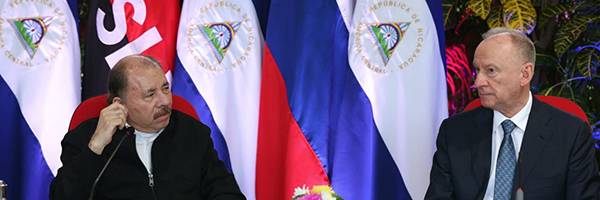Strategic Objectives of Russian Security Council Chief’s Latin America Tour
 Misión Verdad, Orinoco Tribune, March 1, 2024 —
Misión Verdad, Orinoco Tribune, March 1, 2024 —
The secretary of the Security Council of the Russian Federation, Nikolai Patrushev, met with Nicaraguan government officials as well as several officials of Cuba, Venezuela, and Bolivia, in Managua, capital of Nicaragua, on Tuesday, February 27, to discuss security cooperation. On the same day, he visited Cuba where he was received by President Miguel Díaz-Canel and his predecessor Raúl Casto. The two Cuban leaders discussed with Patrushev topics of Cuba-Russia bilateral relations and cooperation as well as issues of international and European security.
From Cuba Patrushev went on to visit Bolivia and Venezuela, which like Cuba and Nicaragua are run by governments not submissive to US global dictatorship. His Latin America tour takes place within a year after he was in Caracas and Havana.
We have already discussed the political and technical profile of Patrushev. On this occasion we would contextualize his visit to Latin America against the backdrop of the geopolitical conflicts that are still ongoing: Russian Special Military Operation in Ukraine, the genocide of Palestinians plus the crisis in the Bab el-Mandeb Strait, and Russia’s pro tempore presidency of the BRICS+ group.
- Strengthening Russia’s relations with partners considered strategic in a region that is geographically distant from Russia: In a context where the geopolitical dispute is shifting to the diplomatic arena, it is of vital importance for Russia to strengthen ties with countries it considers “strategic partners” in a region historically aligned with the interests of the United States. It is not without reason that Patrushev stated that “the development of friendly ties with its key partners in Latin America and the Caribbean remains one of Moscow’s top international priorities,” and that “it is these countries that are at the forefront of the struggle for Latin America’s genuine sovereignty and its rightful place on the world stage.”Moreover, as the white paper outlining the orientation of the Russian foreign policy states, “given the progressive strengthening of the sovereignty and multifaceted potential of the Latin American and Caribbean states,” especially Cuba, Nicaragua, and Venezuela, all belonging to ALBA-TCP, the Russian foreign policy has special attention for them, and therefore expresses the intention to develop relations with them “in a pragmatic, non-ideological and mutually beneficial manner.” The fact that the meeting is being carried out under these premises is neither casual nor spontaneous.
- Multipolarity and international law as the axis of cooperation: Building closer ties necessarily passes through the strengthening of the principles of the United Nations Charter: non-interference in internal affairs, self-determination of the peoples, and respect for sovereignty. Therefore, Russia values the non-alignment of Cuba, Nicaragua, Venezuela, and Bolivia with the Western policy of anti-Russian sanctions which even some Latin American countries such as Chile and Argentina joined.Thus, the degree of independence and cooperation that some countries have shown in relation to the Russian Federation makes them strategic allies which, according to General Patrushev, will receive all the necessary, full and comprehensive support from Moscow. The strategic objective seems to be the establishment of a multilateral cooperation mechanism among the partners to facilitate the planning and implementation of measures aimed at strengthening the sovereignty of Latin America, and raising Latin America’s status on the international scene with a view to protecting all the partners from the restrictions imposed by the United States and its allies through the implementation of unilateral coercive measures.
Patrushev meets Venezuelan defense official
General Nikolai Patrushev also met with Major General José Adelino Ornelas Ferreira, secretary of the National Defense Council (SECODENA) of Venezuela, to discuss bilateral security cooperation issues. Their meeting covered the fight against terrorism, extremism, drug trafficking and organized crime. They also addressed the prevention of “color revolutions” and exchanged views on international security.
Patrushev highlighted the collaboration between Russia and Venezuela to build a just multipolar world order. According to a statement from the Security Council of the Russian Federation, “during the meeting Patrushev emphasized the joint work of Russia and Venezuela to build a fair multipolar world order, promote international law, combat unilateral sanctions, and strengthen the United Nations.”
This is the second meeting that a top Russian official has held with Venezuelan high-level officials in less than 15 days. Only a week ago, Russian Foreign Minister Sergey Lavrov held meetings in Caracas with his Venezuelan counterpart Yván Gil, with Vice President Delcy Rodríguez, and with President Nicolás Maduro himself, which was a prelude to the discussions in Managua, focused on the security and cooperation.
President Maduro’s visit to Russia and meeting with President Putin, originally scheduled for the end of 2023, but which had to be rescheduled due to the Essequibo situation, is still pending. The discussions on bilateral cooperation raised during Foreign Minister Lavrov’s visit to Venezuela and the discussions on security matters by Secretary Patrushev provide an outline of the thematic scope of the conversations to be held between the heads of state of Russia and Venezuela when the meeting takes place, where, in addition to the status of Venezuela within the BRICS+, new mechanisms for military and security cooperation could be announced.
